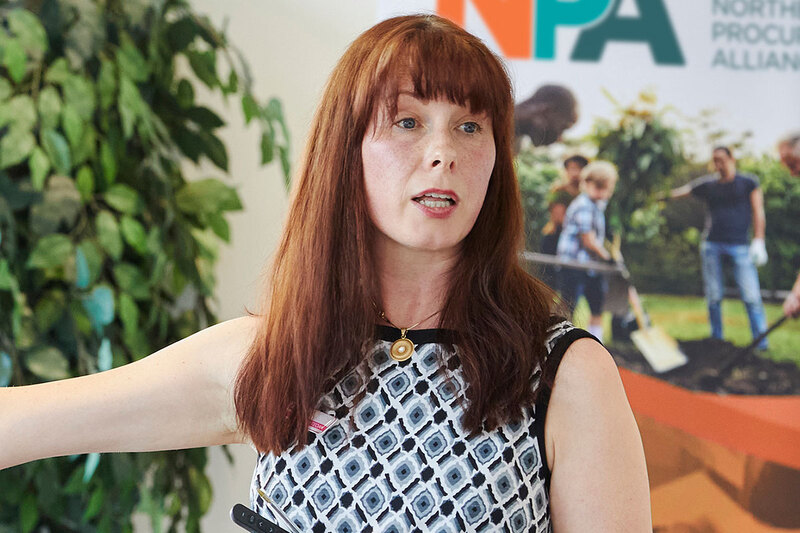Six reasons social housing frameworks are worth their weight in gold
Faye Whiteoak, regional director of Northern Procurement Alliance at the Northern Procurement Alliance (NPA), sets out six reasons why in many cases it is the correct decision to use the right social housing framework – but with one caveat.
I haven’t always been a fan of social housing frameworks. Spoiler alert: I am now.
In my previous professional life as a housing architect and consultant to major contractors looking to build social homes, I found myself questioning frameworks’ relevance, value, and a host of other issues.
They all appeared so complicated, with their extensive terms and conditions, formal tendering processes…and what was the value of having a middleman involved in the contract awarding process anyway?
When I came to NPA and looked at frameworks from the other side, I still had questions, but the difference was that I could stress test the answers in my own organisation.
Those answers are crucial because the stakes are high, as highlighted by North East Mayor Kim McGuinness’s recent announcement of a new development zone for Newcastle and Gateshead, one of the most ambitious regeneration programmes in the UK.
The mayor emphasised her commitment to creating affordable housing and inclusive opportunities for local people and in my opinion the most effective route to delivery is, quite simply, frameworks.
Last year, NPA’s parent organisation, LHC Procurement Group, carried out an exclusive series of anonymous interviews with local authority procurement teams across the UK to help understand how they viewed frameworks.
You can trust the contractor
The findings were revealing: a wider range of supporters than I might have imagined at first, some backing framework providers for historical reasons, or because they knew so-and-so would have knowledgeable insights. Other procurement teams said they couldn’t have got through their extensive workloads without the help of frameworks and yet more applauded the legal rigour and safeguards they provided.
“You can trust the contractor as a result,” said one. “[The T&Cs provide] greater assurance about getting the right end product,” said another.
But this is the procurement team leader’s quote that captured it for me: “The main thing I like about frameworks is the extra resource – there is so much to be done that we can’t possibly run full procurements for all our requirements. That, and the potential savings from the collective bargaining power of many bodies coming together. Also, the access to technical expertise. As people retire it feels like this knowledge is going with them, particularly in areas such as environmental and housing. So frameworks really help.”
After almost 18 months as a leader in construction framework provision for the public sector in the North of England, here are my top six reasons why in many cases it is the correct decision to use the right framework – but with one caveat that procurement teams should be aware of.
1. Streamlined procurement
Frameworks simplify tender processes, ensuring faster project mobilisation while maintaining compliance with public contract regulations and governance requirements.
2. Access to pre-vetted suppliers
Local authorities and social landlords benefit from suppliers who have already met rigorous financial, technical and social value standards, reducing risk and ensuring quality delivery.
3. Driving local social value
This one’s a biggie for me – and fundamental to NPA. Frameworks embed measurable social value targets, such as local employment, apprenticeships and SME engagement, in order to strengthen communities in a meaningful, accountable way.
By this I mean not just a token £1,000 thrown at a playgroup (not that there’s anything particularly wrong with that), but a meaningful, long-term commitment to addressing need in the community. Which leads me on to my next point.
4. Maximising community benefits
Framework providers can negotiate innovative community investment and social value delivery plans, aligning procurement with housing authorities’ regeneration objectives. In other words, authorities are in the driving seat in determining need.
5. Bridging the North-South divide
Frameworks facilitate collaboration across regions, sharing lessons learned, market intelligence and best practice to adapt delivery models that address specific housing challenges in the North, including viability and local contractor engagement. As the mayor summed it up so succinctly, “Everyone in the North East deserves a place they are proud to call home.”
6. Value for money
Collaborative procurement leverages economies of scale, driving cost efficiencies while ensuring frameworks meet high standards of quality and accountability.
Now the caveat. Frameworks can sometimes reduce competition or innovation, and I would caution procurement teams to actively challenge specifications and monitor delivery to avoid supplier complacency.
That said, when it comes to frameworks, I’m one of the converted. It’s a very open, transparent process with everyone involved from the get-go, and there are so many benefits for local authorities. ‘Gold standard’ frameworks – that is, public sector frameworks that are independently verified to meet the very highest standards – are now available in every region of the UK and should be the mandatory minimum for any public sector client.
And if you have any questions, as I did in my previous professional life, I’m always available at the end of the phone.
Contact Faye via: www.northernprocurement.org.uk/contact-us



